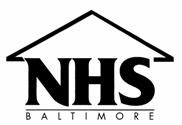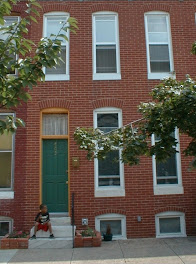By: Ellen Frick, Outreach Coordinator, NHS of Baltimore
As we all know, unemployment rates are extremely high right now. In Baltimore City, the rate of unemployment was 11.7% when measured in January 2010. Yesterday, I participated in a highly-attended job fair put on by Congressman Elijah Cummings. The high turn out rate indicates not only that many people are currently looking for work, but that competition for jobs is likely to be high as well. If you are currently job hunting, give yourself an edge by dressing and acting in a professional manner, and maintaining an assertive and confident demeanor. And make sure to utilize the resources available to you in your job search.
Because of the available market, career coaches and other costly services are now abundant. Before utilizing services that charge a fee, take advantage of the free resources available to job seekers in the area. For instance, the Enoch Pratt Free Library has a Job and Career Information Center located in the Central branch of the library. Attending workshops, consulting directories of job openings, and having someone review your resume are just some of the free services available at the job center. Similarly, the Maryland Department of Labor, Licensing and Regulation has a One-Stop Job Search Center with three locations throughout the city. Another great resource is the Baltimore City Office of Employment Development.
One great way to build your resume during a period of unemployment is to volunteer. Through volunteering, you can gain useful experience and skills to give you an advantage when finding a job. Additionally, getting out in the community and being involved will give you a chance to network and make connections which is increasingly important in finding work. Check out the Business Volunteers Unlimited of Maryland to find volunteering opportunities that meet your interests.
Tuesday, April 20, 2010
Wednesday, April 7, 2010
April is Financial Literacy Month: Ease Into a More Complete Understanding of Your Finances
By: Ellen Frick, Outreach Coordinator, NHS of Baltimore
Money Management International has declared April Financial Literacy Month. Being financially literate simply means possessing an understanding of your personal finances. Fiscal matters are already intimidating to a great deal of people and with so many economic changes throughout the past few years things can be even more confusing. However, MMI emphasizes that financial literacy is a skill we can all maintain. The non-profit credit counseling agency challenges everyone to participate in their thirty steps towards a better understanding of finances.
The thirty-step process is intended to be completed in a month, one step each day. The first step on the path towards financial wellness is to be aware that financial stability is a process and a commitment. Further steps include simple actions such as goal setting, determining net worth, and taking a quiz to cater directly to your financial concerns and needs. In addition to the step-by-step course of action, MMI has compiled a list of tips and gadgets and a blog to ease the process. For additional assistance, check out the FDIC’s consumer tip of the week .
An important thing to remember on your path towards financial literacy is that you do not have to go at it alone. There are countless free resources available to individuals looking to improve their finances. At NHS of Baltimore we teach financial fitness principles and skills in our classes which are held in the evenings. Another great way to expand your financial knowledge is to attend our Financial Fitness Day on Saturday, April 17th from 8:30am – 1:30pm. The event will be held at Pleasant Hope Baptist Church ,located at 430 E Belvedere Avenue in Baltimore. Free workshops at the event include “Beautifying Your Home-Post Purchase Maintenance,” “Prevent Foreclosure!-Loan Modification Options,” and “Money 101- Financing Basics for College Students.” Call 410-327-1200 to register or for more information.
Money Management International has declared April Financial Literacy Month. Being financially literate simply means possessing an understanding of your personal finances. Fiscal matters are already intimidating to a great deal of people and with so many economic changes throughout the past few years things can be even more confusing. However, MMI emphasizes that financial literacy is a skill we can all maintain. The non-profit credit counseling agency challenges everyone to participate in their thirty steps towards a better understanding of finances.
The thirty-step process is intended to be completed in a month, one step each day. The first step on the path towards financial wellness is to be aware that financial stability is a process and a commitment. Further steps include simple actions such as goal setting, determining net worth, and taking a quiz to cater directly to your financial concerns and needs. In addition to the step-by-step course of action, MMI has compiled a list of tips and gadgets and a blog to ease the process. For additional assistance, check out the FDIC’s consumer tip of the week .
An important thing to remember on your path towards financial literacy is that you do not have to go at it alone. There are countless free resources available to individuals looking to improve their finances. At NHS of Baltimore we teach financial fitness principles and skills in our classes which are held in the evenings. Another great way to expand your financial knowledge is to attend our Financial Fitness Day on Saturday, April 17th from 8:30am – 1:30pm. The event will be held at Pleasant Hope Baptist Church ,located at 430 E Belvedere Avenue in Baltimore. Free workshops at the event include “Beautifying Your Home-Post Purchase Maintenance,” “Prevent Foreclosure!-Loan Modification Options,” and “Money 101- Financing Basics for College Students.” Call 410-327-1200 to register or for more information.
Monday, April 5, 2010
Lowering your Property Taxes
By: Salina Greene, Outreach Coordinator, NHS of Baltimore
Many homeowners feel they are paying more than their fair share of property taxes. Home values have pummeled by more than 30 percent, from their peaks, since the housing crisis started. Many believe their homes are over-assessed. According to the National Taxpayers Union,as many as 30% to 40% of residential homes and commercial properties are over-assessed. Only a small percentage (roughly 2% to 3%) of homeowners attempt to go through an appeals process. Research suggests homeowners are a little leery of an appeal based on the perceived complexity of filing for one. In actuality, homeowners who file an appeal enjoy a 20% to 40% success rate as it is a pretty straightforward process. Many people do not know the odds could be in their favor. A little investigation and patience can go a long way, and save you some money in the long run.
In preparation for your case, the first thing one should do is to look for errors in your assessment. Call your local assessor’s office to find out how your district levies taxes, on 100% of the market value or, in addition to some fractions of it. Although fractional assessments are less common, plenty of districts still use them for reference. Each jurisdiction has their own rules and guidelines pertaining to assessment appeals. Make sure you know all of the legalities involved before pursuing an appeal. When you go to the assessor’s office, ask to see the property card for your home. It will list all the details pertaining to your initial assessment. If you choose to file a case you are going to need hard evidence. Remember to check off on all itemized mistakes. This could include square footage or the number of bathrooms. If a written error has occurred, the assessor may be able to fix it immediately. If it is a computer error, the process to correct it may take a bit longer. Also, make sure to ask for the property cards of your immediate neighbors (this is public record) who own similar homes. Crosscheck your assessment with theirs. Most times if there is a 10% or more margin of error you can prepare a good case based on uniformity. It is the assessor’s responsibility to maintain equity amongst owners in the same neighborhoods.
If you need more information and forms to organize your appeal, go to the American Homeowner’s Association, for assistance. This website is full of helpful tips and information.
Many homeowners feel they are paying more than their fair share of property taxes. Home values have pummeled by more than 30 percent, from their peaks, since the housing crisis started. Many believe their homes are over-assessed. According to the National Taxpayers Union,as many as 30% to 40% of residential homes and commercial properties are over-assessed. Only a small percentage (roughly 2% to 3%) of homeowners attempt to go through an appeals process. Research suggests homeowners are a little leery of an appeal based on the perceived complexity of filing for one. In actuality, homeowners who file an appeal enjoy a 20% to 40% success rate as it is a pretty straightforward process. Many people do not know the odds could be in their favor. A little investigation and patience can go a long way, and save you some money in the long run.
In preparation for your case, the first thing one should do is to look for errors in your assessment. Call your local assessor’s office to find out how your district levies taxes, on 100% of the market value or, in addition to some fractions of it. Although fractional assessments are less common, plenty of districts still use them for reference. Each jurisdiction has their own rules and guidelines pertaining to assessment appeals. Make sure you know all of the legalities involved before pursuing an appeal. When you go to the assessor’s office, ask to see the property card for your home. It will list all the details pertaining to your initial assessment. If you choose to file a case you are going to need hard evidence. Remember to check off on all itemized mistakes. This could include square footage or the number of bathrooms. If a written error has occurred, the assessor may be able to fix it immediately. If it is a computer error, the process to correct it may take a bit longer. Also, make sure to ask for the property cards of your immediate neighbors (this is public record) who own similar homes. Crosscheck your assessment with theirs. Most times if there is a 10% or more margin of error you can prepare a good case based on uniformity. It is the assessor’s responsibility to maintain equity amongst owners in the same neighborhoods.
If you need more information and forms to organize your appeal, go to the American Homeowner’s Association, for assistance. This website is full of helpful tips and information.
Subscribe to:
Comments (Atom)




+for+blog.jpg)
.jpg)
